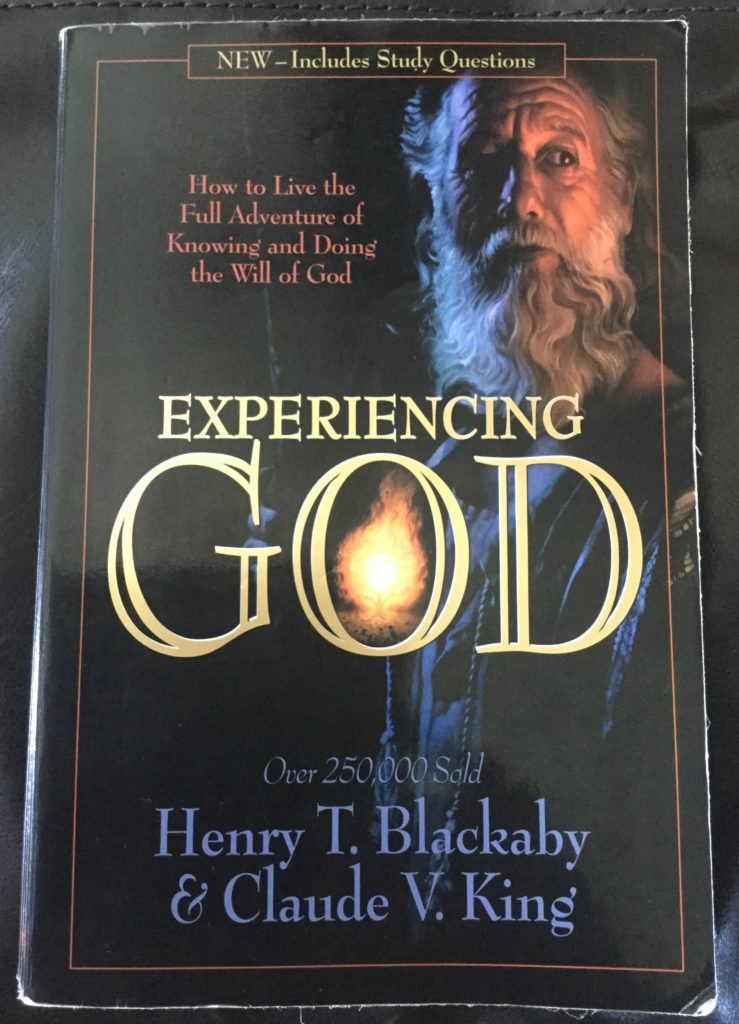Experiencing God by Henry Blackaby and Claude King is a book I’ve had for a long time. Many years ago I read through it (or at least most of it) and over the years the ideas have always enticed me enough to draw me back for a rereading.

The problem is, each rereading would go the same way: The first part is great (as noted by all my highlighting) and then, at some point, his arguments and prescriptions lose me and I give up the reread. Recently, I decided to try again, determined to make it all the way through.
There is lots to like about this book. It emphasizes the importance of a real, personal relationship with God. Blackaby makes the point that when he sits down to his daily devotions, he is not coming to learn about God; he is coming to spend time with God, and I’ve found this to be a frequent reminder in my own daily time with the Lord. He emphasizes the priority of God in the work that is done on this earth, that we are participants but can do nothing and bear no fruit outside His work and action.
The book is also a great reminder (for me, at least, who tends to focus on the academia) that we are meant to experience God. Eternal life, in fact, is described by Christ as coming to know (not “about” but in an intimate way) God and his Son. I don’t think I understood this when I first read the book so many years ago. Now, having markers in my life where the action and power of God was brought to bear experientially in my life, this specific emphasis of the book stands out all the more as true.
It’s the second half of the book, where Blackaby focuses on what comes across as his prescription for experiencing God in powerful ways, that he loses me. Essentially, his message (backed up by examples from Scripture that I find less than convincing) is this:
- God has a plan for what He is doing in the world. (no argument here, by the way)
- We should not seek to “do something for God,” but rather wait for Him to speak specifically to us, telling us what He is doing and inviting us to join Him.
- We are then responsible to adjust our lives to His plan and obey.
- Then we will experience God working powerfully through us to accomplish things that only He can do.
I have a few issues with this. First, it can lead to us waiting around for some special message from the Lord before we act in obedience to his revealed Word. God has told us to be generous, for example. I don’t see in Scripture, however, that we are to wait for more specific instructions from Him (how much, to whom, how often, etc.?) before acting in obedience. Can He and does He at times give specific instructions? Absolutely. I’m just not sure that there’s a specific prescription for every situation. (To be fair, he focuses more on what I’ll call “big actions” like planting churches and sending missionaries, than in the daily acts of obedience.)
Secondly, it felt to me to be taking God’s actions with mankind as a very linear, time-constrained, earth-bound process – God has a plan and you need to match up with it or you’ll miss out and off He’ll go, accomplishing things without you. God’s interactions with humankind seem much more complicated than that. There are times when He accomplishes His purposes through us when we don’t even know it; when He accomplishes his purposes through the acts of unbelievers; when His purposes involve our failure (discipline, trial, etc.). There are even times when His plan doesn’t look like what we would consider “success.” Is there some truth here, that if I am not obedient, I’ll miss out on His blessing and reward? Sure! But I’m not sure His ways are quite so cut-and-dried as they seemed to be presented here.
Finally, as mentioned above, the book left me wondering about all the hundreds of “smaller” decisions I make every day and how I would know God’s specific will in each of them. It’s something that I still wrestle with: generosity and love and kindness and evangelism are all commanded and there are a thousand ways to do each of them. How do I know God’s will in each specific situation? I didn’t think that Blackaby particularly answered this question, focusing more on what we would typically identify as “big”, spiritual actions.
This was not a wasted read, to be sure. Overall, though, I would not apply it woodenly, but use it to inform my personal walk with the Lord.
One final note: I really liked how the book was written. Simple, straightforward writing and very repetitive, but not in a bad way. He got his point across and then circled back to it, over and over throughout the book, so you were sure to get it. It was helpful and effective for me.
